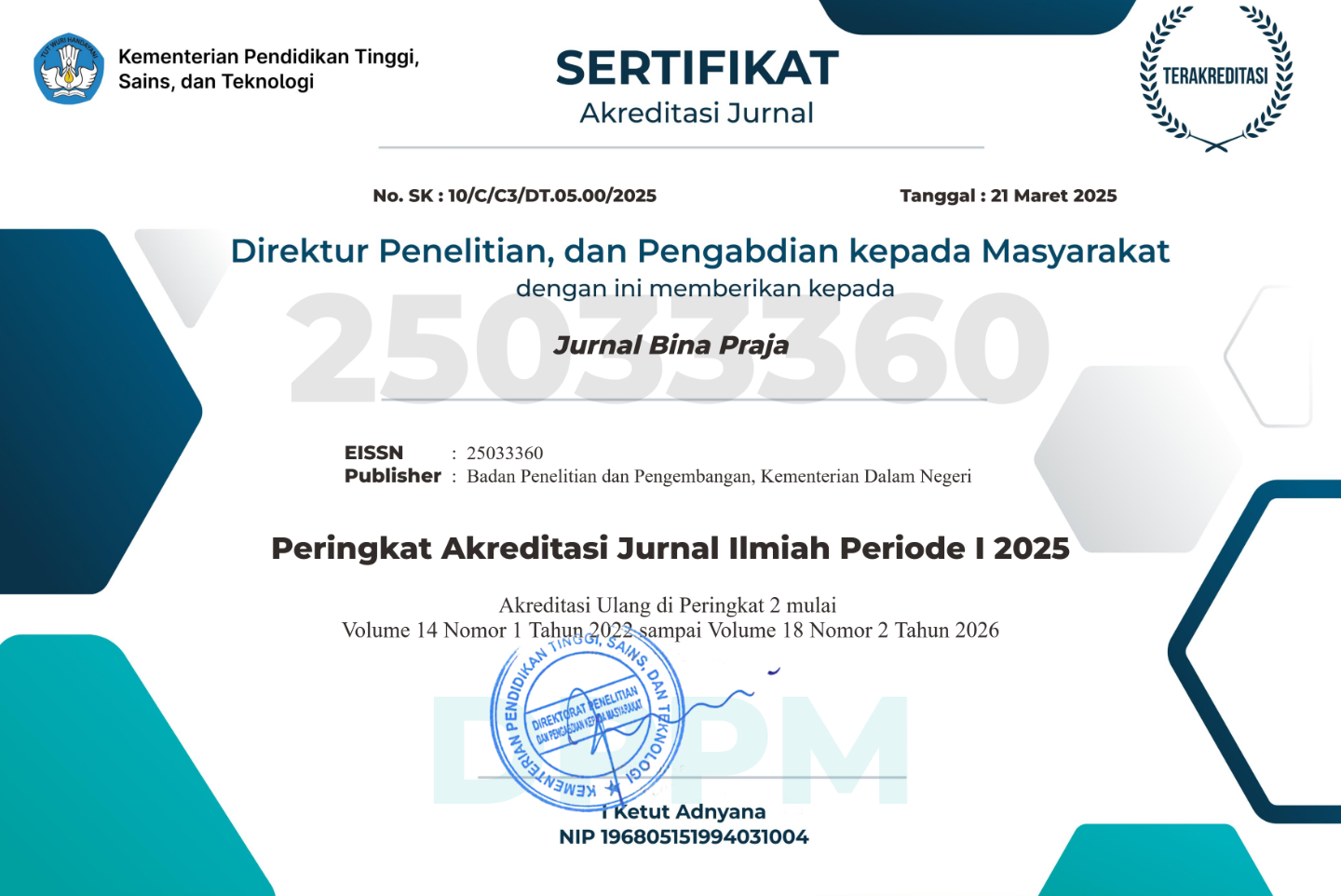Digital ID Policy in Support of Digital Transformation in Indonesia
DOI:
https://doi.org/10.21787/jbp.17.2025.1-18Keywords:
Digital ID, Digital Transformation, Digital Population Identity, Population Data, Public Services, Population AdministrationAbstract
The Indonesian government has initiated the implementation of Digital ID or Digital Population Identity (IKD) as part of the national digital transformation strategy, particularly in supporting the Electronic-Based Government System (SPBE) and the integration of public services. However, IKD adoption remains relatively low. This is indicated by the high demand for e-KTP forms over the past 5 years, especially since the IKD was implemented in 2022. Based on these conditions, this study asks three main questions: (1) What are the strengths and strategic opportunities that support the implementation of IKD? (2) What are the real results and public aspirations regarding the implementation of IKD? and (3) How can IKD support digital transformation in Indonesia?
This study employed an explanatory sequential mixed-methods approach. The quantitative phase was conducted first through a survey of 688 respondents who assessed eight policy alternatives based on effectiveness, efficiency, and impact. A thematic analysis of open-ended responses in the same questionnaire followed the qualitative phase. All data were then analyzed using the SOAR (Strengths, Opportunities, Aspirations, Results) framework to map policy strategies based on strengths, opportunities, public expectations, and expected outcomes.
The research results showed that the main strength lies in a centralized population data infrastructure and continuously evolving regulations. Strategic opportunities include the integration of IKD into the Priority Population Data Service (SPBE) through GovTech INA Digital, as well as the utilization of digital data verification in the financial and banking sectors. Public aspirations are reflected in the need for digital literacy and better personal data protection, while expected outcomes, such as optimizing IKD-based public services, have not been fully achieved. Meanwhile, IKD has not been fully able to support the digital transformation process in Indonesia.
This study concludes that digital information technology (IKD) policy strategies need to be directed at integrating IKD with public services, strengthening cross-sector collaboration, developing responsive regulations, and conducting massive and inclusive public education. These findings contribute to the formulation of service-oriented, evidence-based, and sustainable digital transformation policies to support digital transformation in Indonesia.
Downloads
References
Babel, M., Willburger, L., Lautenschlager, J., Völter, F., Guggenberger, T., Körner, M.-F., Sedlmeir, J., Strüker, J., & Urbach, N. (2025). Self-Sovereign Identity and Digital Wallets. Electronic Markets, 35(1), 28. https://doi.org/10.1007/s12525-025-00772-0
Cole, M. L., Stavros, J. M., Cox, J., & Stavros, A. (2022). Measuring Strengths, Opportunities, Aspirations, and Results: Psychometric Properties of the 12-Item SOAR Scale. Frontiers in Psychology, 13. https://doi.org/10.3389/fpsyg.2022.854406
Daud, I. I., Sumaryana, A., Nurasa, H., & Susanti, E. (2022). Electronic Digital Indentification (E-KTP) as an Element of E-Democracy in Indonesia. KnE Social Sciences, 776–783. https://doi.org/10.18502/kss.v7i5.10593
Dawadi, S., Shrestha, S., & Giri, R. A. (2021). Mixed-Methods Research: A Discussion on its Types, Challenges, and Criticisms. Journal of Practical Studies in Education, 2(2), 25–36. https://doi.org/10.46809/jpse.v2i2.20
Eka Patrisia, N., Warsono, H., Kismartini, & Dewi, R. S. (2022). Dukcapil Service Innovation in Improving the Quality of Service in the Lebong District. Jurnal Public Policy, 8(3), 124–128. https://doi.org/10.35308/jpp.v8i3.4599
Fathurrahman, Safitri, J., Munizu, M., & Nasir. (2024). Strategy for Optimizing Regional Original Income (PAD) Through Innovation and Collaboration in Central Lombok Regency. Jurnal Bina Praja, 16(2), 347–359. https://doi.org/10.21787/jbp.16.2024.347-359
Fitriani, Nurmandi, A., Lawelai, H., Kasiwi, A. N., & Younus, M. (2025). Trends and Challenges of Digital Transformation in the Public Sector: Policy Implications for Improving Public Services in Indonesian. Aristo, 13(2), 681–705. https://doi.org/10.24269/ars.v13i2.11288
Friedhoff, T., Au, C.-D., Ladnar, N., Stein, D., & Zureck, A. (2023). Analysis of Social Acceptance for the Use of Digital Identities. Computers, 12(3), 51. https://doi.org/10.3390/computers12030051
Giannopoulou, A. (2023). Digital Identity Infrastructures: A Critical Approach of Self-Sovereign Identity. Digital Society, 2(2), 18. https://doi.org/10.1007/s44206-023-00049-z
Hafel, M. (2023). Digital Transformation in Politics and Governance in Indonesia: Opportunities and Challenges in the Era of Technological Disruption. Society, 11(2), 742–757. https://doi.org/10.33019/society.v11i2.577
Isabella, Agustian, E., Baharuddin, T., & Ibrahim, A. H. H. (2025). Bridging E-government With Digital Literacy: A Literature Review. Journal of Governance and Regulation, 14(1, Special Issue), 361–371. https://doi.org/10.22495/jgrv14i1siart12
Jerab, D. A. (2024). The Impact of Digital Transformation on Public Services.
Kamkankaew, P. (2023). Current Trends in Strategic Management: A Comparative Analysis of SWOT and SOAR Approaches. RMUTT Global Business Accounting and Finance Review, 7(2), 63–78. https://doi.org/10.60101/gbafr.2023.269044
Karya, M. A., Haryono, B. S., & Sujarwoto. (2024). Digitalization and Innovation of the Service Process: The Efforts to Improve the Quality of Higher Education Services in Kalimantan Island. Jurnal Bina Praja, 16(1), 69–81. https://doi.org/10.21787/jbp.16.2024.69-81
Memon, M. A., Thurasamy, R., Ting, H., & Cheah, J.-H. (2025). Purposive Sampling: A Review and Guidelines for Quantitative Research. Journal of Applied Structural Equation Modeling, 9(1), 1–23. https://doi.org/10.47263/JASEM.9(1)01
Mislawaty, S. E., Harahap, R., & Anisyah, S. (2022). Digitalizing Governance in South Sumatera: An Introduction “E-Sumsel” System Reforming Public Service Management. Jurnal Bina Praja, 14(3), 399–411. https://doi.org/10.21787/jbp.14.2022.399-411
Pradnyandari, M. P., Yudhiantara, I. M., & Permana Putra, I. P. A. (2025). Pelayanan Anjungan Dukcapil Mandiri (ADM): Analisis Kinerja Pelayanan Publik Melalui Model Service Quality di Kota Denpasar. Good Governance, 21(1), 19–36. https://doi.org/10.32834/gg.v21i1.887
Sedlmeir, J., Smethurst, R., Rieger, A., & Fridgen, G. (2021). Digital Identities and Verifiable Credentials. Business & Information Systems Engineering, 63(5), 603–613. https://doi.org/10.1007/s12599-021-00722-y
Toyon, M. A. S. (2021). Explanatory Sequential Design of Mixed Methods Research: Phases and Challenges. International Journal of Research in Business and Social Science, 10(5), 253–260. https://doi.org/10.20525/ijrbs.v10i5.1262
Ushaka Adie, B., Tate, M., & Valentine, E. (2024). Digital Leadership in the Public Sector: A Scoping Review and Outlook. International Review of Public Administration, 29(1), 42–58. https://doi.org/10.1080/12294659.2024.2323847
Venkatesh, V., & Sykes, T. A. (2013). Digital Divide Initiative Success in Developing Countries: A Longitudinal Field Study in a Village in India. Information Systems Research, 24(2), 239–260. https://doi.org/10.1287/isre.1110.0409
Zahlimar, Bakar, A., Permana, I., Siswoyo, M., & Hamirul. (2023). Analysis and Study of the Use of Digital National Identity Card Services in Generation Z. Open Access Indonesia Journal of Social Sciences, 6(5), 1061–1068. https://doi.org/10.37275/oaijss.v6i5.172
Downloads
Published
How to Cite
Issue
Section
License
Copyright (c) 2025 Author(s)

This work is licensed under a Creative Commons Attribution-NonCommercial-ShareAlike 4.0 International License.















